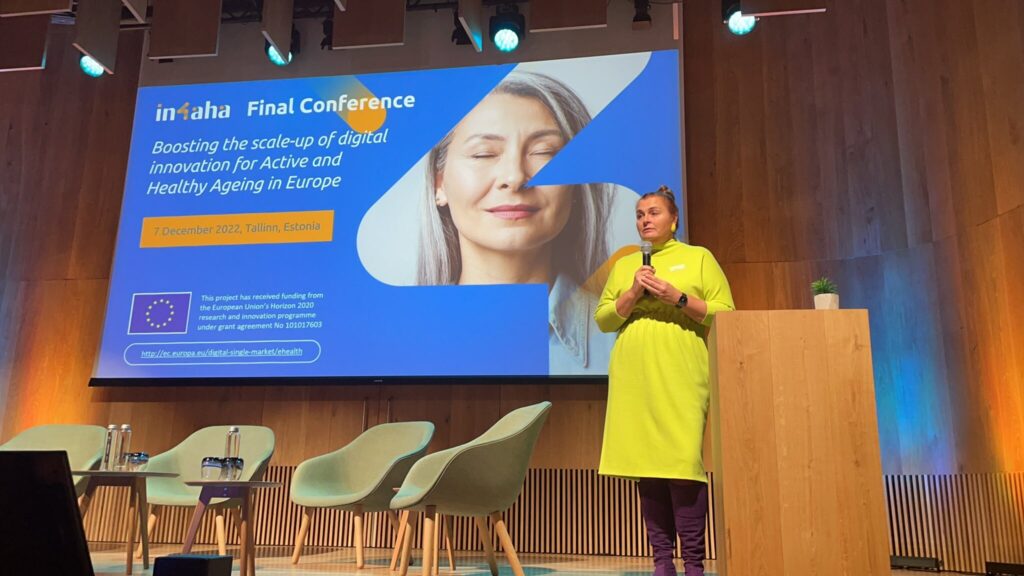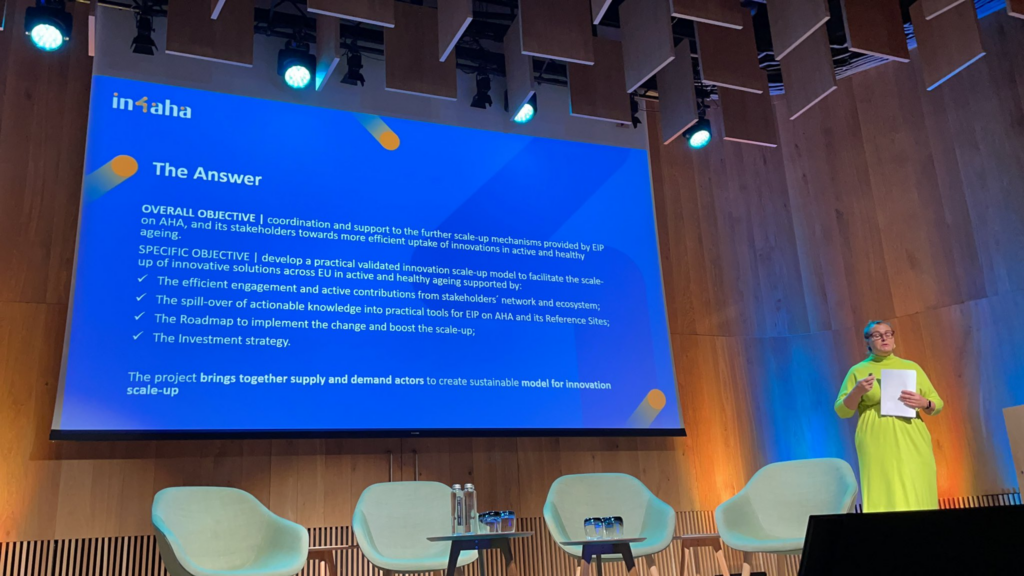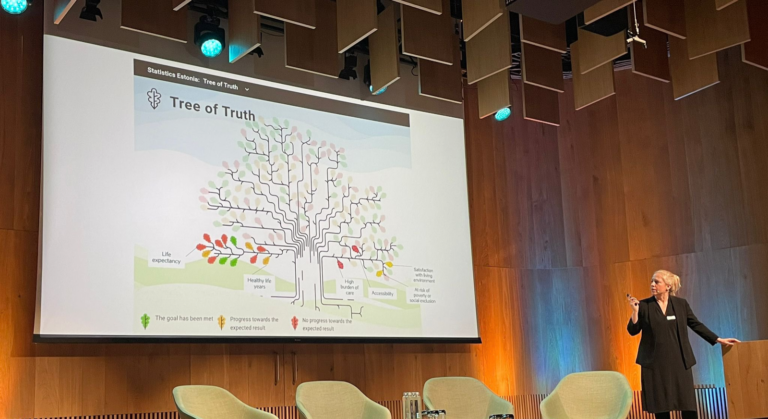After two years of hard work and collaboration by the IN-4-AHA project consortium partners, Cluster Saúde de Galicia, Civitta, Praxis, EIT Health Scandinavia, Proud Engineers, XAMK, University of Porto Competence Center for Healthy and Active Ageing Porto4Ageing, SIH EEIG – Slovenian Innovation Hub, and EUREGHA – European Regional and Local Health Authorities, under the guiding leadership of Tehnopol, our project comes to an end. We celebrated our achievements during the final conference on 7 December. The event took place at the Arvo Pärt Centre in idyllic Laulasmaa, Estonia, and was streamed online so people from all over Europe could join. The whole conference was moderated by Tjaša Zajc.


The day started with welcoming words from European Commission Vice-President for Democracy and Demography, Dubravka Suica. Next, Piret Hirv, IN-4-AHA project leader at Tehnopol/Estonian Connected Health Cluster introduced the IN-4-AHA project, the challenges to be tackled and how the consortium chose to approach these. Emphasizing the co-creational character of IN-4-AHA, she explained: “From the beginning, we designed the project around the core concepts of person-centeredness and end-user involvement”.
Nele Labi, Undersecretary General for Innovation at the Estonian Ministry of Social Affairs, further set the mood with her keynote speech on how to bring innovation to service provision in health and care, sharing valuable insights into the Estonian case. “Innovation is not just about ideas, but about execution”, she said, adding that “to create more room for innovation we need to start sharing our data”. In line with this statement, the potential of data and data sharing proved to be a recurring topic throughout the day for speakers as well as members of the audience.

Below you will find a brief summary of the main take-aways from each panel. The full recording is also included and will remain available for you at any time, should you wish to recap part or all of the IN-4-AHA final conference. At the end of this article, you can find the full recording of the conference and other interesting project resources to browse through.
The European investment landscape in the field of AHA
Andreas Palm, Senior Consultant, CIVITTA, IN-4-AHA WP6
Piret Hirv, Project leader IN-4-AHA, Tehnopol/Estonian Connected Health Cluster
Annika Szabo Portela, Managing Director, EIT Health Scandinavia
- The European AHA market is growing and likely to remain stable over the coming years
- Smart combinations of public funding in early development stages and private funding in later stages are needed to boost innovation
- Living Lab testing can help gain market access
- Focus on the development of needs-based solutions
- Find partnerships and experts to support your innovation process
- Investment readiness assessment & long-term investment plan
Evaluating innovation, Living Labs, and the potential of person-centeredness
Gisela Garcia Alvarez, Managing Director, Cluster Saude de Galicia, IN-4-AHA WP4
Anni Kurmiste, Health Policy Analyst, Praxis Think Tank, IN-4-AHA WP5
Nick Guldemond, Professor healthcare and public health at Sechenov Medical University and Leiden University Medical Center in the Netherlands, Expert Member WHO Working Group Digital Health
Victor Stephani, Chief of Staff, HelloBetter
- Living Lab environments offer real world testing conditions and opportunities for co-creation with end-users.
- Person-centeredness of an innovation correlates with the potential for uptake, meaning a higher degree of person-centeredness leads to increased potential for adoption.
- Evaluation should be incorporated into all stages of innovation development from beginning to end, preferably including a measure of person-centredness.
- Only needs-based solutions are worth developing further.
- Person-centeredness is a necessary component for certification within the German DiGA system – potential example for other countries.
- Overview of existing evaluation toolkits, IN-4-AHA innovation assessment framework, evaluation toolbox, living lab testing & innovation scale-up playbook.
Harmonising regulations – Health data for Active and Healthy Ageing
Hille Hinsberg, Product Manager, Proud Engineers, IN-4-AHA WP5
Liina Joller-Vahter, Project Manager, EIT Health Scandinavia, IN-4-AHA WP2
Jukka Lähesmaa, Consulting Officer, Ministry of Social Affairs and Health, Finland
Karolina Mackiewicz, Innovation Director, ECHAlliance
- Data governance one of the main challenges to be tackled in digital transformation of health
- Efforts to harmonise legislation, e.g. through the upcoming European Health Data Space, prompt necessary revision of companies and organisations’ data governance structures
- Several Nordic countries are in the vanguard of digitalisation, for example Estonia with its sophisticated eGovernment structure where citizens control all their data on a single platform. Furthermore, Finland has aggregated all data related to health and social care under the Finnish Social and Health Data Permit Authority instead of letting them reside within the separate institutions collecting these data.
- Surveys from ECHAlliance have shown people are ready and willing to share health data, we now need secure systems to enable this.
- IN-4-AHA Data Governance Guidebook.
Active and Healthy Ageing and Living in Europe: present and future
Michele Calabro, Director, European Regional and Local Health Authorities, IN-4-AHA WP7
Donna Henderson, Head of International Engagement, Digital Health and Care Directorate, Scottish Government
Nele Labi, Vice-chancellor for Innovation, Estonian Ministry of Social Affairs, Estonia
Mihkel Tedremaa, Co-founder, TempID
- EU level is moving from Active and Healthy Ageing towards concept of Active and Healthy Living, signaling a life-course approach not tied to any specific age bracket but rather focused on health prevention and promotion of active, healthy lifestyles.
- Harnessing the potential of data access and data sharing are crucial for the future of health and social care.
- Co-creation and consistent stakeholder engagement are essential to ensure person-centeredness, and by extension uptake of innovative solutions.
- Innovation is not just about ideas, but most importantly about execution.